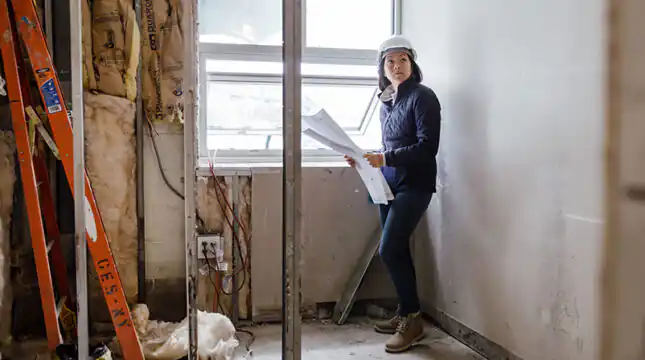What is residential vs. commercial construction?
Before diving into specifics, it’s crucial to draw a line between what defines residential construction vs. a commercial project. For example, is an apartment building residential or commercial? The easiest way to know for sure is to ask whether the building is designed to be lived in.
Using that as a guide, residential construction can include:
- Single-family homes
- Detached homes
- Duplex, triplex, fourplex
- Townhouses
- Housing cooperatives
- Condominiums
Commercial construction, however, usually includes:
- Land investments
- Office buildings
- Retail space
- Restaurants
- Hospitals
- Storage units
- Industrial buildings
There’s one exception: Large-scale multifamily structures. While apartment buildings technically cater to residences, they often lean more towards the commercial side due to their scale, complexity and associated building requirements.
With that knowledge in hand, let’s explore the key differences between each construction type.
1. Licensing
Construction projects can have different contractor license requirements depending on their type. You might hold a general license that lets you take on both residential and commercial, but some licenses can limit the scope of work.
For example, residential contractors typically need a basic contractor’s license, while a commercial contractor may need a specific license that requires additional exams, training or qualifications.
2. Permits and codes
The level of regulatory scrutiny can vary between residential and commercial construction. Residential permits and building codes help ensure homes are safe and habitable, focusing on aspects like structure, plumbing, electrical wiring, insulation and HVAC systems.
Permitting requirements are more complicated for commercial buildings. It can involve multiple layers of approval from various authorities, including zoning boards, planning commissions and building departments. Commercial building codes typically address fire safety, accessibility, structural design, egress requirements and mechanical systems.
3. Location
Location is a key differentiating factor in commercial and residential construction. In residential construction, you must consider the surrounding area. Factors such as noise levels, construction traffic and the proximity of work activities to nearby properties are crucial considerations. After all, you don’t want your workers and equipment to disturb the neighbors.
Commercial projects may not have residential neighbors to worry about. However, site selection and environmental reviews can take a long time. Because the risk of theft is higher, commercial projects may involve more elaborate security systems, including fences, cameras or guards to protect your tools and equipment.
4. Design considerations
Design considerations are another sticking point. The ability to customize a design varies significantly between residential and commercial properties, with residential projects typically offering more flexibility.
For residential construction, you might work closely with architects and homeowners to personalize design elements to match individual tastes and needs, such as room layouts, paint colors, fixtures and finishes.
But commercial construction has less wiggle room. Contractors must carefully plan changes to make sure they don’t compromise feasibility, budget constraints or regulatory compliance.
5. Materials
The choice of materials is a significant difference between commercial and residential construction. Aesthetics and comfort take center stage in residential projects, resulting in a wide range of material options, such as wood, ceramic tiles and granite. On the other hand, commercial construction uses steel, concrete and large glass panels due to their ability to withstand heavy usage and comply with strict safety regulations.
6. Equipment
The construction equipment you need can vary greatly depending on the project. Compact and versatile machines like excavators, bulldozers, and smaller power tools are common in residential construction.
However, in commercial construction, the equipment requirements may be quite different. You might need larger and more specialized machinery, such as cranes, forklifts, and pavers.
It’s also important to consider the additional training, licensing, or certification that you might need to operate this type of machinery.
7. Costs
Residential projects are pretty straightforward when it comes to cost, with an average price of $150 per square foot, depending on location. The national average to build a house is around $329,000, not including land.
A commercial project is more nuanced and varies based on its type and size, ranging anywhere from $240 to $870 per square foot. For instance, a single-story commercial office building averages $240 to $440 per square foot, while mid-rise ($330 to $870) and high-rise office buildings ($430 to $1,000) have a higher square footage price tag.
8. Duration and deadlines
Also, the timelines for completing a project and deadlines can be considerably different between the two.
Residential construction projects typically have shorter timelines that can span a few months. Commercial construction typically takes longer, extending to years because of their larger sizes, intricate designs and regulatory requirements.
Commercial projects can also involve multiple phases, such as site preparation, foundation work, structural construction, and interior finishing, each with its own set of deadlines and milestones. Meeting these deadlines is critical in commercial construction, as delays can have financial repercussions and disrupt business operations.
Understanding residential and commercial construction
In the end, contractors should be aware that there are a lot of differences between working in commercial vs. residential construction. However, there are also many overlaps, and many contractors succeed in both environments.
Whether you choose to specialize in one or straddle both, understanding the ins and outs of each allows for better decision-making, increased flexibility, and a chance to stand out in a competitive market.
Simplify your business protection with NEXT
At NEXT, we recognize that your time is valuable, and your focus should be on growing your business. That’s why we make it effortless to find and purchase the essential contractor business insurance to protect yourself and your employees.
With NEXT, you can get a quick quote, compare options, and secure your certificate of insurance online in about 10 minutes.
Get started with an instant quote.






